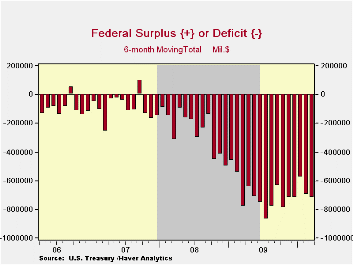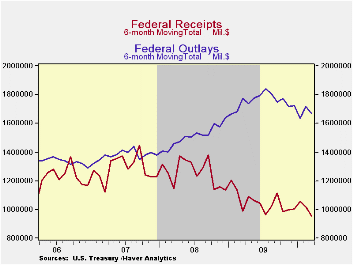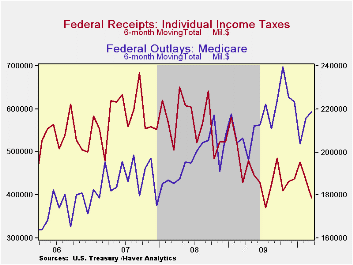 Global| Apr 13 2010
Global| Apr 13 2010U.S. Budget Deficit Eased Versus FY'09
by:Tom Moeller
|in:Economy in Brief
Summary
For March, the U.S. federal budget deficit eased enough to pull the deficit during the first six months of FY'10 to $717.0B versus $781.4B during the first six months of last fiscal year. According to the U.S. Treasury Department, the [...]

For March, the U.S. federal budget deficit eased enough to pull the deficit during the first six months of FY'10 to $717.0B versus $781.4B during the first six months of last fiscal year. According to the U.S. Treasury Department, the deficit of $65.4B compared to Consensus expectations of $62.0B.
The hemorrhaging of Federal revenues due to the past recession eased with moderate economic recovery. Net revenues during the first six months of FY'10 fell 3.6% y/y versus declines near 20% last year. As the employment picture brightened, the decline in individual income tax receipts fell to 8.4% y/y through March versus a 14.7% decline during the first six months of FY '09. The decline in corporate tax receipts also eased sharply to 4.0% as corporate profits improved. Working the other way was a record 5.0% decline in social insurance taxes and contributions. Also, estate & gift taxes fell by nearly one-quarter, double the rate of decline during last fiscal year's first six months.
Overall outlays declined 5.7% during the first six months of FY'10 as outlays for the Troubled Asset Relief Program more-than reversed the February increase. Defense spending (19% of total outlays) rose by one-quarter y/y. Health spending (15% of total outlays) continued to trend higher but income security payments (11% of outlays) surged by one-quarter versus last year with higher unemployment. Growth in social security payments (21% of outlays) rose 4.0% and net-interest payments (5% of outlays) rose with higher rates. Medicare expenditures (12% of outlays) rose by two-thirds but other health care services spending (10% of outlays) fell modestly.
The Government's financial data are available in Haver's USECON database, with extensive detail available in the specialized GOVFIN.
Public Opinion on Taxes from the American Enterprise Institute can be found here.


| US Government Finance | March | FY 'YTD | FY 'YTD | FY 2009 | FY 2008 | FY 2007 |
|---|---|---|---|---|---|---|
| Budget Balance | $-65.4B | $-717.0B | -- | $-1,417.1B | $-454.8B | $-161.5B |
| Net Revenues | $153.4B | $953.9B | -3.6% | -16.6% | -1.7% | 6.7% |
| Net Outlays | $218.7B | $1,670.9B | 5.7% | 18.2% | 9.1% | 2.8% |
Tom Moeller
AuthorMore in Author Profile »Prior to joining Haver Analytics in 2000, Mr. Moeller worked as the Economist at Chancellor Capital Management from 1985 to 1999. There, he developed comprehensive economic forecasts and interpreted economic data for equity and fixed income portfolio managers. Also at Chancellor, Mr. Moeller worked as an equity analyst and was responsible for researching and rating companies in the economically sensitive automobile and housing industries for investment in Chancellor’s equity portfolio. Prior to joining Chancellor, Mr. Moeller was an Economist at Citibank from 1979 to 1984. He also analyzed pricing behavior in the metals industry for the Council on Wage and Price Stability in Washington, D.C. In 1999, Mr. Moeller received the award for most accurate forecast from the Forecasters' Club of New York. From 1990 to 1992 he was President of the New York Association for Business Economists. Mr. Moeller earned an M.B.A. in Finance from Fordham University, where he graduated in 1987. He holds a Bachelor of Arts in Economics from George Washington University.






